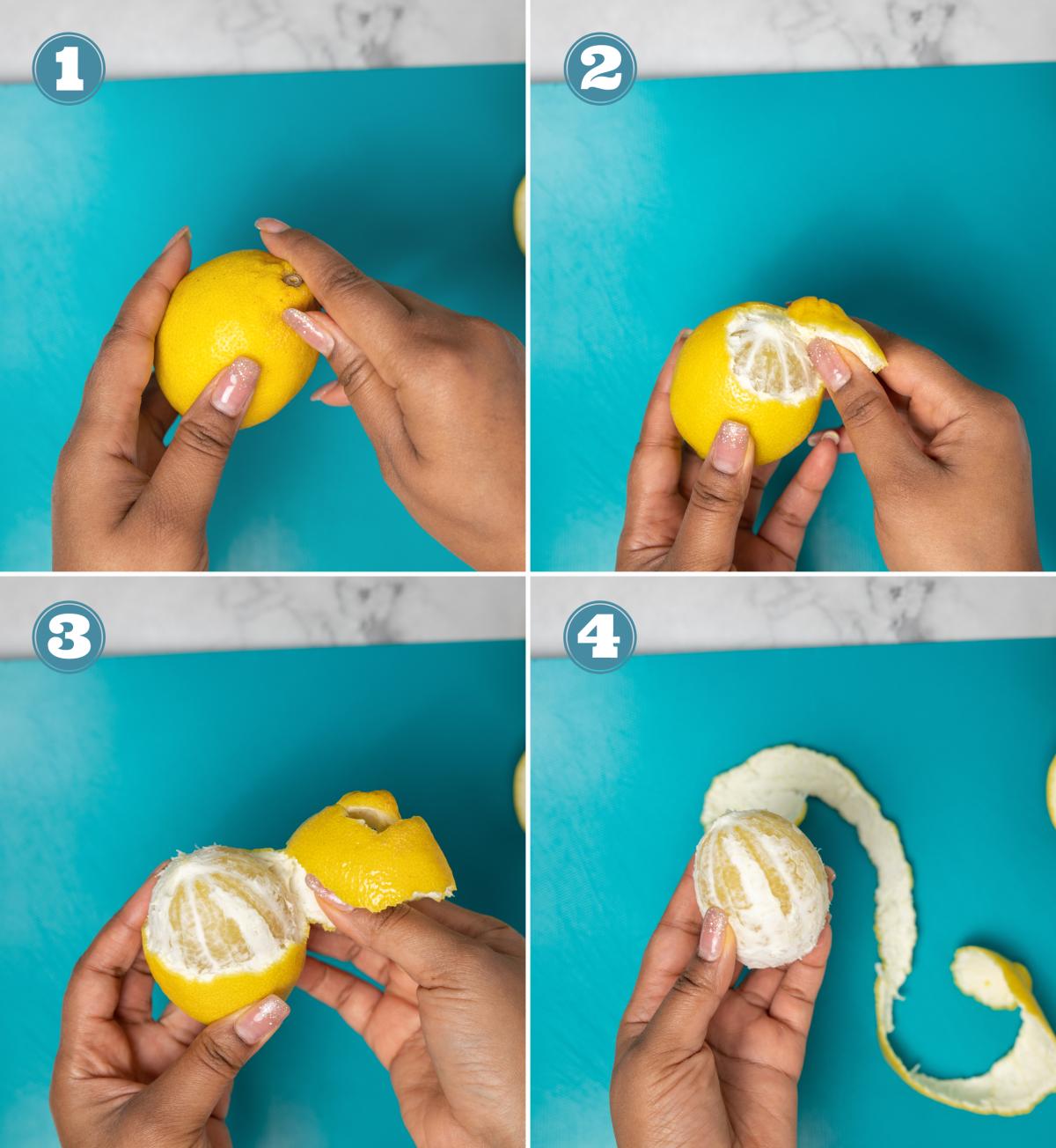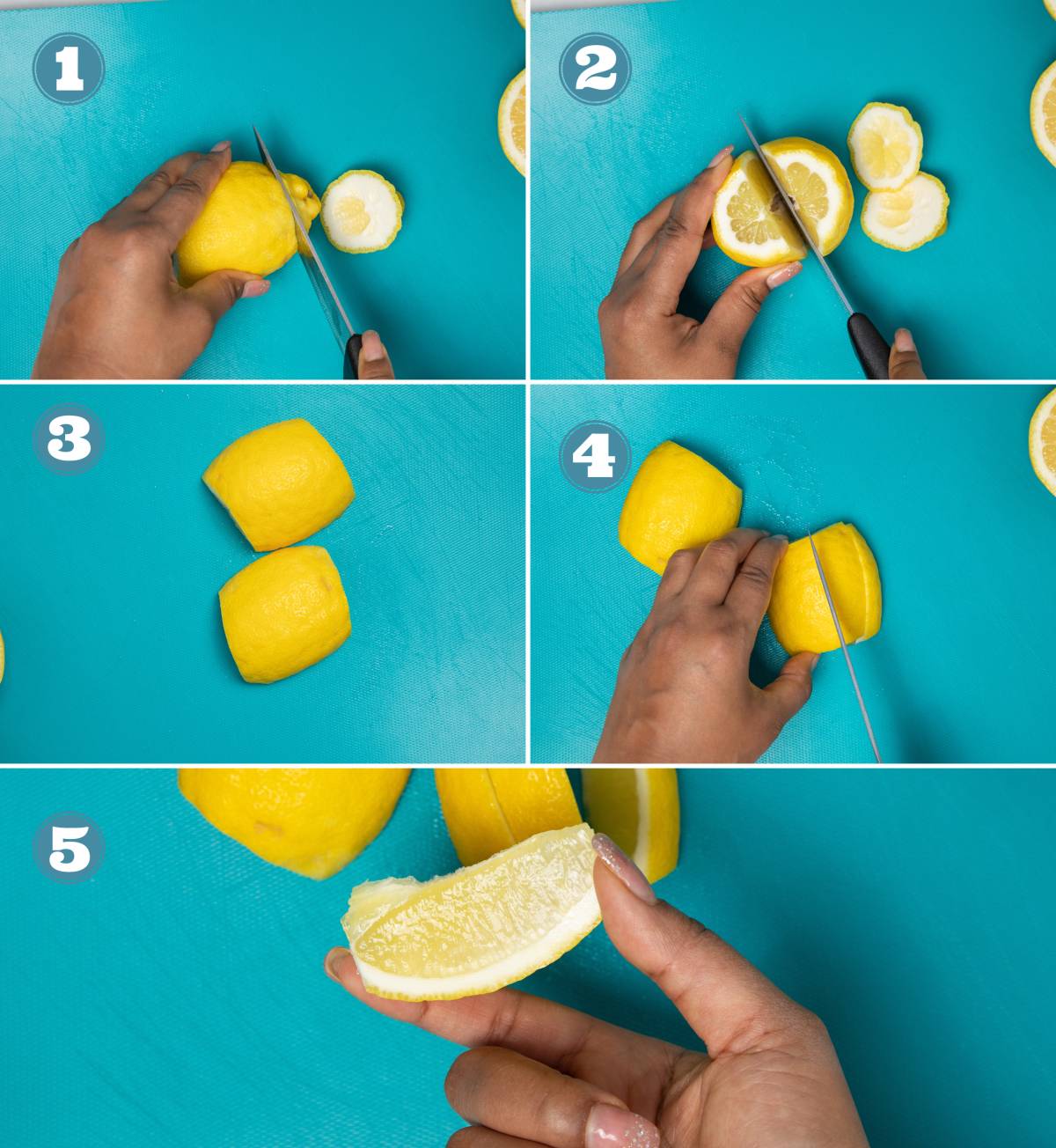Cutting Lemons For Food And Drinks In 4 Easy Ways
Today’s tutorial is all about how to cut lemons. Not only will we take a look at 4 ways to cut lemons for food, but different ways you can prepare and cut lemons for delicious drinks!
And, if you are looking for some delicious lemon recipes, you have to try this Passionfruit Lemonade and this Lemon Fennel Salad.

How To Prepare Lemons For Cutting
Before we dive right into cutting lemons, let’s quickly discuss how to prepare lemons. Don’t worry, it’s quick.
Virtually all that needs to be done is the lemon needs to be washed. This is especially important if you aren’t peeling the lemon before serving it.
To wash a lemon, you just need to rub it clean with a cloth under cold running water. If there are any stubborn stains or dirt, you can use a vegetable scrubber to remove them as well.
Then, if you do plan on peeling the lemon, you can use two methods: hand peeling or peeling the lemon with a knife.

When you hand-peel a lemon, it’s as simple as tearing off the skin like you would for an orange. But, this doesn’t remove the bitter pith. That’s not always a problem, but if you truly only want the flavor of the lemon juice, it’s best to cut away the rind.
To cut away the rind, start by trimming the top and bottom of the lemon. This will expose how thick the rind is. Then, using a sharp paring knife, cut away the rind, following the shape of the lemon. Keep cutting until all of the rind is removed.
And there you have it! The only two things that you might need to do before cutting your lemons. But again, the peeling part isn’t always needed.

How To Cut Lemons 4 Different Ways
There are mainly four ways in which lemons are cut for food. They include wedges, slices, segments, and cubes.
But, if you make a lemon sauce, you won’t be able to use lemon wedges. In this instance, diced (peeled) lemons or lemon segments will work best.
The exact cut you end up choosing depends on how you want to use the lemon. For example, lemon wedges are best for garnish so that guests can squeeze their own juice over their meal. In this case, none of the other cuts will work.
More Cutting Guides
1. How To Cut A Lemon Into Wedges
This is the easiest way to cut lemons. Again, you have to wash the lemons. Usually, they aren’t peeled for this cut, but you can if you want to.
- Remove the top and bottom of the lemon (optional).
- Then, place the lemon on one of the flat, cut ends, and slice the lemon in half.
- Set each half on the cutting board and slice it into 3 or 4 pieces. The pieces should be wedge-shaped. So all your cuts should be pointed toward the center.

2. How To Make Lemon Slices
Making lemon slices is just as easy. These slices make beautiful decorative pieces, but can also be the hero of the recipe. A great example of a way to utilize lemon slices is to make candied lemon pieces.
You can also make dried lemon slices that work as a garnish for cakes and other baked goods.
And of course, lemon slices make a delicious fragrant bed to roast various types and cuts of meat on. An especially popular option is roasted, grilled, or baked tilapia on a bed of lemon slices with herbs.
- To start your lemon slices, cut off the top of the lemon.
- Then, hold the lemon on its side with your non-dominant hand.
- Cut the lemon into pieces with a thickness that you like.
- Keep slicing until you reach the end.

3. How To Cut Lemon Segments
Making citrus segments are a way to cut around the pith and membrane in the fruit. Both of these parts are slightly bitter and have strange, somewhat off-putting textures. So, many people love this technique to remove them.
These segments are great for garnishing, making sauces, coulis, marmalades, and jams, and making small bite-sized treats. And, while it’s not common, you can use them in drinks.
- To start, you have to peel the lemon using the knife method. It’s the only way to effectively remove the pith on the outside of the lemon.
- Once the rind is removed, hold the lemon in your non-dominant hand.
- Make a slice close to the membrane, all the way down to the middle of the lemon.
- Then, slice against the other membrane (on the opposing side), down to meet the other cut in the center of the lemon.
- Once your segment is loose, remove it and set it aside.
- Repeat the process with all the other segments.

4. Making Cubed or Diced Lemon
Finally, you can also make diced lemon pieces. This is usually necessary when you make sauces, purees, or jams. Anything where you need smaller pieces of fruit for a finer texture dish.
- Peel the lemon using any one of the peeling methods.
- Cut the lemon into quarters.
- Then, cut each quarter into smaller pieces, either 3 or 4 depending on the size of cubes you want.
For this method, it’s important to remove as much of the white membranes as possible to avoid having a fibrous texture. And, don’t forget to remove the seeds!

How To Cut Lemons For Drinks
Now, cutting lemons for drinks is pretty much the same as cutting them for food. But there are slight variations you can use.
1. How To Slice Lemons For Drinks
When making sliced lemons for drinks, they will likely look a little different than sliced lemons for food.
For one, they will probably be much thinner. Lemon slices for drinks can be wafer-thin if you’d like. This makes it easy to curl up and use as a flavoring and garnish.
Then, you can also use lemon slices and cut them in halves, quarters, or even smaller.

2. How To Cut Lemon Wedges For Drinks
Lemon wedges for drinks shouldn’t have any white membranes on them. It helps to top and tail the lemons first. This way, you can cut them into wedges alongside the membranes.
You can also play around with the thickness of the wedges. And, as many drinks have, you can make half wedges as well.




